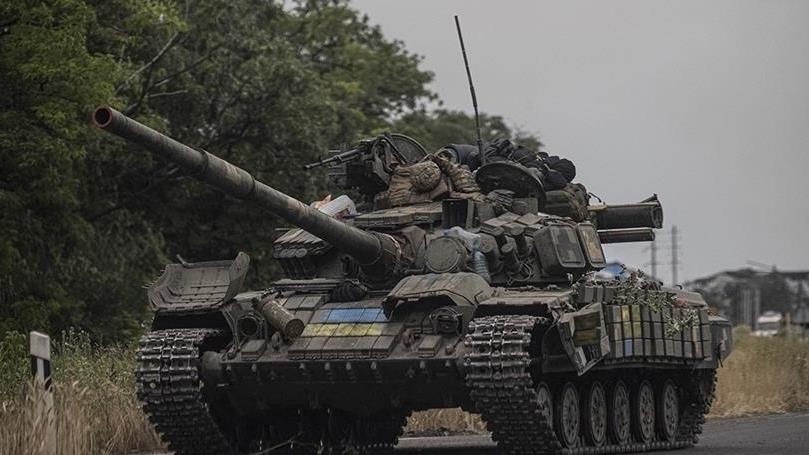3 QUESTIONS - Germany’s decision to send battle tanks to Ukraine
Professor Kemal Inat explores reasons behind Germany’s policy change on Russia-Ukraine war, its possible consequences

The author is a professor of international relations at Türkiye's Sakarya University.
ISTANBUL
Germany's long-awaited decision this week to send Leopard 2 tanks to Ukraine, and also allow other countries to do so could be a major turning point in the nearly year-old war.
Kemal Inat explores the reasons behind Germany’s policy change on the Russia-Ukraine war, and its possible consequences.
Why is Germany sending heavy battle tanks to Ukraine?
Germany has decided to initially send a company of 14 Leopard 2 battle tanks to Kyiv, which Ukrainian President Volodymyr Zelenskyy had long requested.
Ukrainian soldiers will soon begin training on the armored vehicles, and Berlin will also authorize other countries that have their own stocks of Leopard tanks to export them to Ukraine.
With this announcement, the standoff between Germany and the US – which is also sending 14 Abrams tanks to Ukraine – and an internal row within the German coalition government over sending the tanks to Ukraine, stands settled.
But the move will likely have a negative impact on German-Russian ties.
And this is why, German Chancellor Olaf Scholz from the Social Democratic Party (SPD), the major party in the ruling coalition, was reluctant in giving a green light for German-made tanks to be sent to Ukraine.
Since the start of the war, Scholz and other prominent members of the SPD hesitated to take a leading role in the crisis between Russia and the West.
Germany at first was even unsure of supplying arms to Ukraine, and impose sanctions on Moscow.
Scholz, however, backed down due to pressure from coalition partners, as well as the US and other allies, and had to act in unison.
Leading politicians from the Greens and the Free Democratic Party (FDP), the two junior partners to Scholz’s Social Democrats, said Ukraine is not only defending itself but also fighting for the freedom of Europe, and thus Berlin should take the leading role expected from it.
Besides, UK’s promise to send 14 British Army Challenger 2 battle tanks, and the US decision to equip Ukraine with M1A1 Abrams tanks, also led Scholz to reverse the policy.
By taking a joint decision with allies, Scholz believes his country does not have to go it alone in the West's fight against Russia.
What does it mean for Germany?
Delivering the Leopard 2 tanks to Ukraine means, above all, another defeat for Chancellor Scholz against his party’s junior coalition partners, and the US, and EU allies such as Poland, Lithuania, and Estonia, the countries at the forefront of condemning Russia's "special military operation."
Interestingly, Zelenskyy had requested tanks from Western countries right after the start of the war last February. No Western country including the US, UK, and France complied, but only Germany was blamed for a stalemate over Leopards.
The US hesitated to send tanks until recently with some weak arguments such as difficulties in overseas transportation and that their turbine engine requires jet fuel.
Germany has failed in positive perception management, considering the fact it provided the most arms and weapons to Ukraine after the US and UK.
It has already delivered many advanced weapons to Kyiv, including Gepard anti-aircraft tanks, multiple rocket launchers, and the IRIS-T air defense system.
But a row within the coalition government created ripple effects that impacted public opinion negatively.
Greens and the FDP being closer to Washington than their coalition partner SPD, vis-à-vis their approach to the war, is preventing Germany from pursuing a rational policy.
How can Germany’s military support change course of the war in Ukraine?
The Ukrainian army is struggling in advancing against Russian troops and even had to retreat in some critical territories such as the eastern town of Soledar, but receiving Leopard 2 tanks could be a turning point.
The armored vehicles could help the Ukrainian army defend itself against the anticipated Russian spring offensive and advance its own troops, but the delivery of and training on the battle tanks are crucial.
In addition to Germany, Poland, Spain, the Netherlands, and Finland are also seeking Berlin's permission to send Leopards from their own inventories.
German Defense Minister Boris Pistorius said the promised tanks could be delivered to Kyiv as early as the end of March, which shows Ukrainian army is in a race against time to punch through Russian defenses.
The German government, despite the reluctance of the major coalition partner, is involving itself in the war.
This situation escalates the risk of a direct conflict with Moscow, and also decreases the possibility of normalization between Germany and Russia, even after the end of the military conflict.
*Opinions expressed in this article are the author's own and do not necessarily reflect the editorial policy of Anadolu.
Anadolu Agency website contains only a portion of the news stories offered to subscribers in the AA News Broadcasting System (HAS), and in summarized form. Please contact us for subscription options.







